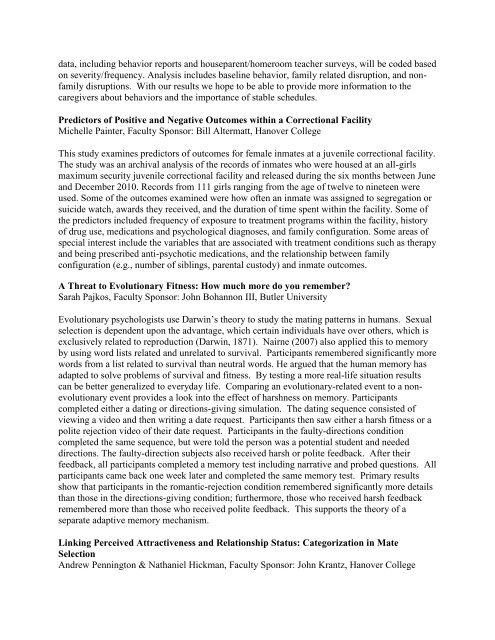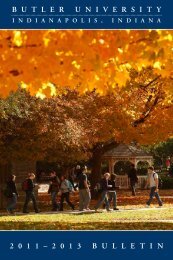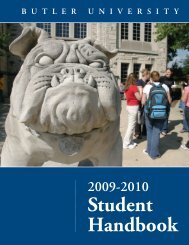Anthropology - Butler University
Anthropology - Butler University
Anthropology - Butler University
Create successful ePaper yourself
Turn your PDF publications into a flip-book with our unique Google optimized e-Paper software.
data, including behavior reports and houseparent/homeroom teacher surveys, will be coded based<br />
on severity/frequency. Analysis includes baseline behavior, family related disruption, and nonfamily<br />
disruptions. With our results we hope to be able to provide more information to the<br />
caregivers about behaviors and the importance of stable schedules.<br />
Predictors of Positive and Negative Outcomes within a Correctional Facility<br />
Michelle Painter, Faculty Sponsor: Bill Altermatt, Hanover College<br />
This study examines predictors of outcomes for female inmates at a juvenile correctional facility.<br />
The study was an archival analysis of the records of inmates who were housed at an all-girls<br />
maximum security juvenile correctional facility and released during the six months between June<br />
and December 2010. Records from 111 girls ranging from the age of twelve to nineteen were<br />
used. Some of the outcomes examined were how often an inmate was assigned to segregation or<br />
suicide watch, awards they received, and the duration of time spent within the facility. Some of<br />
the predictors included frequency of exposure to treatment programs within the facility, history<br />
of drug use, medications and psychological diagnoses, and family configuration. Some areas of<br />
special interest include the variables that are associated with treatment conditions such as therapy<br />
and being prescribed anti-psychotic medications, and the relationship between family<br />
configuration (e.g., number of siblings, parental custody) and inmate outcomes.<br />
A Threat to Evolutionary Fitness: How much more do you remember?<br />
Sarah Pajkos, Faculty Sponsor: John Bohannon III, <strong>Butler</strong> <strong>University</strong><br />
Evolutionary psychologists use Darwin’s theory to study the mating patterns in humans. Sexual<br />
selection is dependent upon the advantage, which certain individuals have over others, which is<br />
exclusively related to reproduction (Darwin, 1871). Nairne (2007) also applied this to memory<br />
by using word lists related and unrelated to survival. Participants remembered significantly more<br />
words from a list related to survival than neutral words. He argued that the human memory has<br />
adapted to solve problems of survival and fitness. By testing a more real-life situation results<br />
can be better generalized to everyday life. Comparing an evolutionary-related event to a nonevolutionary<br />
event provides a look into the effect of harshness on memory. Participants<br />
completed either a dating or directions-giving simulation. The dating sequence consisted of<br />
viewing a video and then writing a date request. Participants then saw either a harsh fitness or a<br />
polite rejection video of their date request. Participants in the faulty-directions condition<br />
completed the same sequence, but were told the person was a potential student and needed<br />
directions. The faulty-direction subjects also received harsh or polite feedback. After their<br />
feedback, all participants completed a memory test including narrative and probed questions. All<br />
participants came back one week later and completed the same memory test. Primary results<br />
show that participants in the romantic-rejection condition remembered significantly more details<br />
than those in the directions-giving condition; furthermore, those who received harsh feedback<br />
remembered more than those who received polite feedback. This supports the theory of a<br />
separate adaptive memory mechanism.<br />
Linking Perceived Attractiveness and Relationship Status: Categorization in Mate<br />
Selection<br />
Andrew Pennington & Nathaniel Hickman, Faculty Sponsor: John Krantz, Hanover College
















